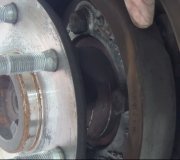There is only ONE proper repair for brake fluid contaminated with a petroleum product. You MUST replace every part that has rubber that contacts the fluid, flush and dry the steel lines, then refill with clean brake fluid. That includes calipers, wheel cylinders, master cylinder, all four rubber hoses, combination valve, and the anti-lock hydraulic controller if you have anti-lock brakes.
There is no acceptable shortcut in just replacing one part as it fails. Oil will leach out of the other parts and contaminate any new ones. I used to do a demonstration for my students in my Brakes class. I put 1/2" of clean brake fluid into two beakers, dropped a wheel cylinder lip seal into each one, then added one drop of power steering fluid to one of them. After one week the contaminated seal had grown by about 20 percent and was soft and mushy, just like the bladder seal is now under the cap of your reservoir.
What you will notice first is the brakes are dragging and getting very hot. That's because the lip seals in the master cylinder have grown past the fluid return ports and are trapping the fluid preventing it from returning to the reservoir. Eventually the pistons will stick in the calipers from the seals expanding and holding the piston tightly in place. The hoses will become mushy and could pop a leak. They will likely squeeze out of the very tight crimps that hold them to the metal fittings.
Be advised too that I made a real big deal with my students that they must wash their hands before even poking that bladder seal into the reservoir cap. A little grease on their fingers from repacking wheel bearings is more than enough to contaminate the system.
Hi rasmataz. Sorry for jumping in here but this is a real important topic to me. Hope you're having a dandy day.
Monday, March 8th, 2021 AT 10:52 AM


